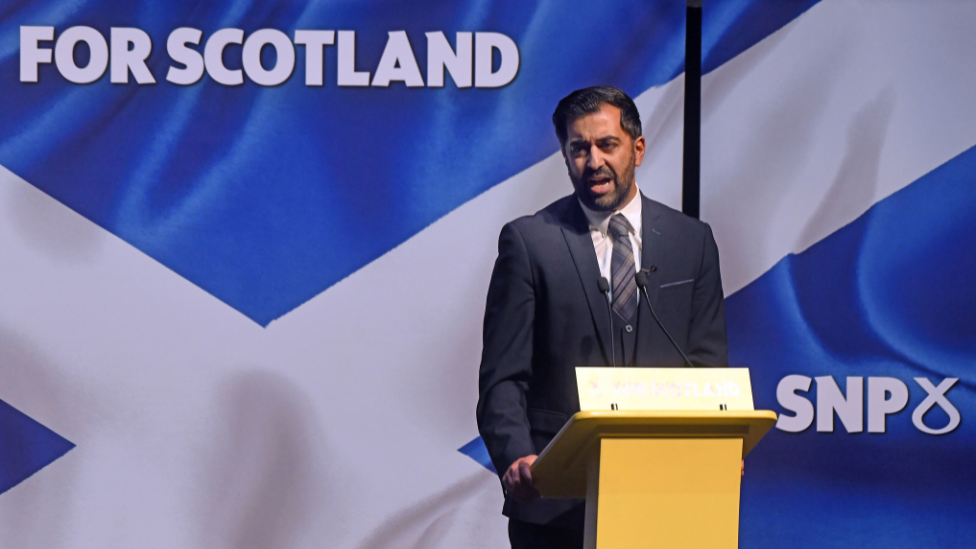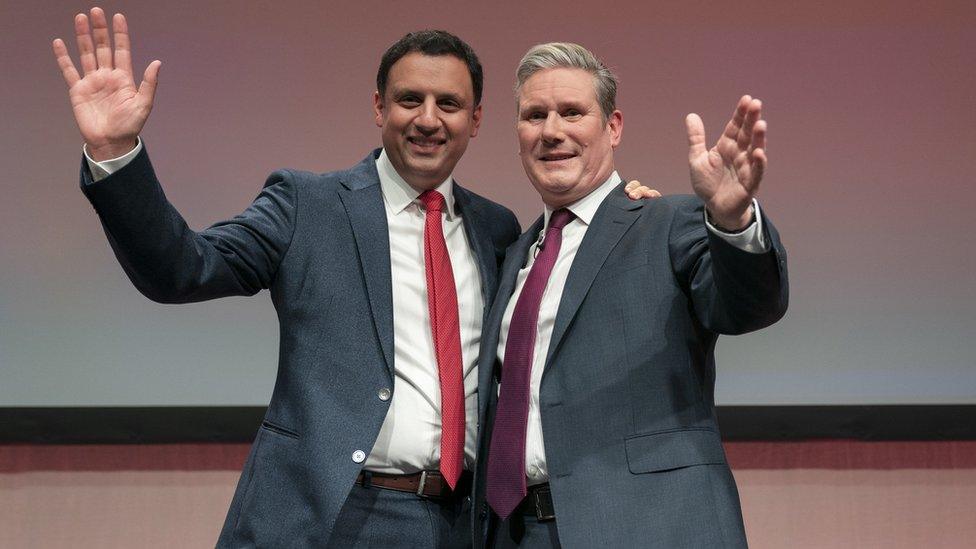Why is Humza Yousaf targeting the Tories?
- Published

Humza Yousaf spoke at the SNP's campaign council in Perth on Saturday
The language our politicians choose to use is always pored over endlessly - especially when one of the most potentially transformative UK general elections in years is getting closer by the day.
Some particular language that's being deployed by Humza Yousaf as he revs up his party's campaign engine has been raising eyebrows.
At the SNP's National Campaign Council in Perth at the weekend, the first minister made a rallying cry to the party base that took in its core message for the coming general election.
"Most seats across Scotland are a straight fight between the SNP and the Tories," he told the party faithful.
It is part of his call to voters to use the election as an opportunity to make Scotland "Tory free".
SNP figures stress that this won't be the sole message of the party's election campaign. The crux of it is a call to vote SNP - rather than Labour - as the most effective way to keep the Conservatives out.
But the message has been criticised as "confusing", with at least one SNP MP pledging not to use any "Tory-free rhetoric" in his election campaign.
So why is the first minister focusing his fire on the Tories rather than the arguably much bigger fight he has on his hands against Scottish Labour?
Are most seats in Scotland a straight fight between the SNP and Tories?
Humza Yousaf said in his speech on Saturday that "most seats" in Scotland are an SNP-Conservative fight as part of his "Tory-free" sales pitch to voters.
That is incorrect.
The notional results for the new boundaries, taking into account the first and second places for all 57 Scottish seats, show that the SNP is in a fight with the Conservatives in 24 seats, with Labour in 28 seats, and with the Liberal Democrats in five seats.
It is worth noting, however, that the first minister has been more nuanced with his wording on other occasions - saying that "in every Tory-held seat in Scotland we are the party in second place".
This is indeed the case.
But why the focus on this handful of Conservative seats in the north-east and along the border with England?
For one, the SNP has a chance of gaining seats here, whereas the fight against Labour in places like Glasgow and the central belt - the tougher fight, according to the polls - points to more of a damage-limitation exercise to try to stem the losses.
It might just be the case that capitalising on a national mood which seems to be against another Conservative government in Westminster could help the SNP shore up and maintain its position as the third biggest party in the UK Parliament, and the enhanced standing that comes with that.
The first minister has also been careful to present himself as holding out an olive branch to UK Labour. He knows that the Scottish electorate, by and large, would prefer to see Sir Keir Starmer in Downing Street than Rishi Sunak.
So it's a careful dance between battling a resurgent Labour in Scotland and not wanting to be accused of trying to shore up the Conservatives in Number 10 by appearing too hostile to the prospect of the UK Labour government.
How big a challenge is the SNP facing from Labour?

Anas Sarwar and Sir Keir Starmer are targeting SNP seats across central Scotland
The threat to the SNP in Glasgow and swathes of the central belt is very real.
The contrast between the "Tory-free" message from the SNP at Holyrood and the consistent attacks the party's Westminster group has made on Labour in recent months - rather than the Conservatives - is noteworthy.
It is also worth noting that unlike the vast majority of England and Wales, there's basically nowhere in Scotland which is a Conservative vs Labour fight.
That leaves the SNP effectively fighting many more battles - and of varying nature - than their opponents.
Some in the SNP, for example, expect that the party's clear stance on an immediate ceasefire in the Gaza conflict - which has proved a sore spot for Labour - may well prove a key message in areas such as Glasgow.
What have people said about Mr Yousaf's message?
The Tory-free message hasn't been without its critics.
The SNP's longest-serving MP, Pete Wishart, described it as "unhelpful" and said he would not use it in his campaigning ahead of the next general election.
He told BBC Scotland News: "At the last election almost 20,000 people voted Tory in my constituency and they have a right to have their view and vote respected."

Pete Wishart has said he will not use the anti-Tory messaging in his election campaign
Liz Lloyd, the former top advisor to Mr Yousaf's predecessor Nicola Sturgeon, told BBC Scotland that the anti-Conservative messaging was "a little confusing".
Her views were dismissed by the SNP MP Joanna Cherry - who also said it was right that there should be a debate about the party's message.
Dr Philippa Whitford, who's standing down as the SNP MP for Central Ayrshire at the next election, said the first minister is trying to capitalise on what she described as "universal" anger with the Conservatives.
She disagreed with Mr Wishart's assessment, but said she would like to see independence playing a more prominent role in the campaign.
"I think independence and that longer-term vision for Scotland has to be in the campaign and I certainly hope it'll grow more," she said.
"Labour are being very clear they now consider their unionism to be a main part of the party.
"The challenge is that with a complete block on democratic routes at the moment there isn't a simple offer from the SNP."
The Scottish Conservative leader Douglas Ross has used the SNP's message to paint the party as contemptuous of the very voters they are trying to appeal to.
"Humza Yousaf's divisive rhetoric shows why we are asking pro-UK voters to vote together for the Scottish Conservatives. If we unite once more, we can beat the SNP and end their campaign to divide Scotland for good," he said.
Scottish Labour leader Anas Sarwar has dismissed the SNP strategy as "desperate" and "insulting the intelligence of people across Scotland".
"Everyone knows the next general election is a fight between Labour and the Tories," he told the Daily Record.
Given recent questions around the stability of the Conservative Party and Rishi Sunak's leadership, it may not be too long before these fights get going in earnest in battlegrounds across Scotland.